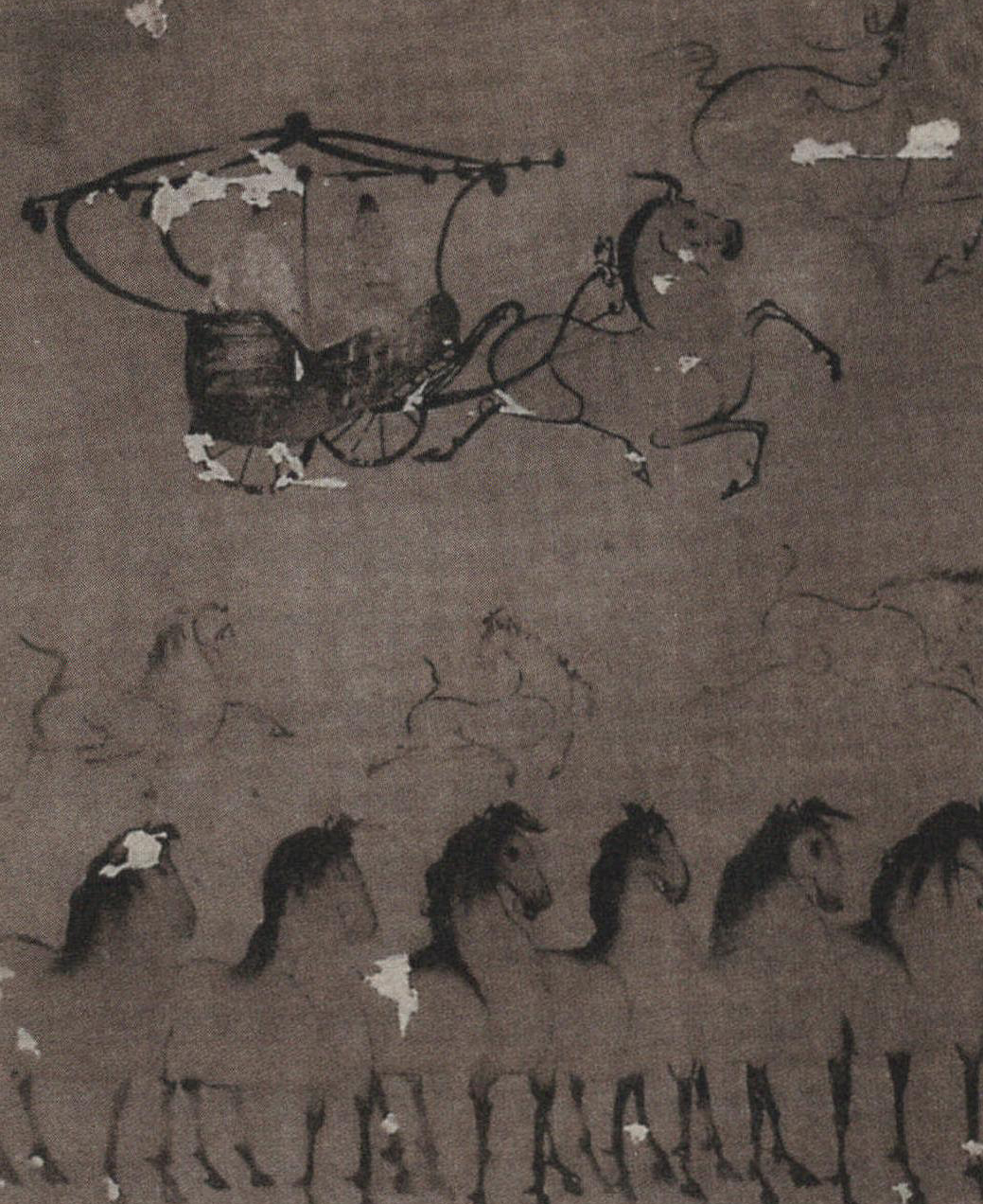皇甫规(103~174),东汉将领,字威明,安定郡朝那县 (今宁夏彭阳古城镇)人。将门之子,祖父皇甫棱曾任西汉度辽将军,父亲皇甫旗做过扶风都尉。受家庭影响,喜读兵书,熟谙兵法,具有韬略。第一次担任功曹时,就曾率勇士八百名,大败羌人,初步显示了军事才干。汉顺帝死后,由梁太后临朝执政,大将军梁冀主持朝中军政大事。梁冀与太监勾结,专横跋扈,倒行逆施,满朝文武大臣谁也不敢说话。就是在这种黑暗的政局下,朝廷仍按例定期在全国选拔优秀后备人才,称为“举贤良方正” 。皇甫规也报了名,并在称为 “对策” 的试卷中,公开揭露朝廷的黑暗,还把矛头直接指向梁冀,所以虽然被录取了,但是只被任命为一个称之为郎中的小官。皇甫规看到自己的远大抱负无法实现,就弃官返回故里,自办一个学馆,先后招收学生三百多人,专心为国家培养人才,而且一干就是十四年。

东汉贵族饰物
Noble ornaments of Eastern Han Dynasty
汉桓帝和平元年(150),梁太后归还朝政,随即病故。桓帝很快就下决心革除了以梁冀为代表的外戚与宦官相勾结联合专权的政治毒瘤。延熹二年 (159),皇甫规被朝廷重新任用,担任太山 (今山东泰安)太守。延熹四年 (161)冬,羌人起义的烈火在西北蔓延,护羌校尉段颎出师不利,起义军攻占了并 (今山西太原) 、凉 (今甘肃武威)二州之后,一直打到了京畿地区,朝廷十分惊恐,三公们一致推举皇甫规担任中郎将,持节监关西兵马,指挥讨伐羌人的战斗。但他并没有沿用 “主战派”们习用的大军剿杀的老办法对付羌人,而是采取 “招抚” 的方式,很快就降服了羌人,使西北地区重新实现了平稳,他本人也被破格提升为度辽将军。永康元年 (167),皇甫规被召回京城升任尚书。一到任就上疏要为党锢株连的人辩冤平反,但是桓帝不接受他的意见,并把他调出京城,先任弘农(今河南灵宝)太守,又改任护羌校尉。熹平三年(174),皇甫规病逝在谷城(今山东平阴东阿镇)。生前曾封为寿成亭侯。

牧马图
Herding Horses
皇甫规一生,不主张以武力对付人民,他曾著文说过,君主是舟,人民是水,文武群臣都是乘舟的人,将士们是划桨的人。只有大家同心协力,这条船才能平稳安全。反之就会沉船,大家一起被淹死。他的这种水与船之间辩证关系的思想,影响深远,对历代统治阶级有很大的教育意义。
皇甫规一生尚武、好学,不仅治边有方,与名将张奂(字然明)、段颎(字纪明)齐名,被史家誉为“西州三明” 。而且一生中爱才、善文,所著赋、铭、碑、赞、吊、章、表、教令、书、檄、笺记等各类文学作品约二十七篇。还编有《皇甫规集》 (已失传),现今只留存著作十二篇,被后人辑入《二酉堂丛书》中。
Huangfu Gui (A.D. 103-174),styled as Weiming,was a general of the EasternHan Dynasty (A.D.25-220),and a native of Chaona County in Anding Prefecture (present-day Pengyang in Ningxia). He came from a general'sfamily. His grandfather Huangfu Leng had assumed the office of Duliao general of Western Han Dynasty (B.C.206-A.D.8) and his father Huangfu Qi had been commander-in-chief. Influenced by his family,he was fond of reading books on the art of war and was well versed in warcrafts and military strategies. When he was a gongcao(an official title in ancient China),he,commanding 800 warriors,defeated Qiang people utterly,which initially showed his military genius. After the death of Emperor Shun,Empress dowager Liang temporarily came into power,and military-political affairs of the state were in the charge of Senior General Liang Ji,the elder brother of Empress dowager Liang. In collusion with eunuchs,he was imperious and despotic,pushing reactionary policies. None of the ministers dared to resist. Nevertheless,the conventional policy of selecting able and virtuous talents regularly every year was still in effect. So Huangfu Gui registered himself and in the test paper of "Strategies" he overtly exposed the evil rule of the royal court,directing his attack at Liang Ji. Thus,although he was enrolled,he was just appointed as langzhong (a minor official title in ancientChina). Thinking his great ambition could not be realized,he quit office and returned to his hometown,where he set up a school and produced a total of more than 300students. He devoted 14 years to cultivating new talents for the country.
In the first year of the Heping reign (150 A.D.) of Emperor Huan,Empress dowager Liang handed over the state power to Emperor Huan and died of illness soon after that. Before long Emperor Huan managed to remove the Liang Ji-led political combination between the relatives of Empress dowager Liang and eunuchs,which had monopolized the royal court for long. In the second year of the Yanxi reign (159 A.D.),Huangfu Gui was appointed prefectural governor of Taishan (present-day Tai'an in Shandong Province). In the fourth year of the Yanxi reign (161 A.D.),Qiang people's uprisings spread to the northwest of China in the winter. Duan Jiong,commandant,was thwarted in the first battle. After conquering Bingzhou (present-day Taiyuan in Shanxi province) and Liangzhou (present-day Wuwei in Gansu Province),the insurrectionary army moved straight to Jingji (vicinity of the capital city then),which threw the royal court into panic. Three dukes all elected Huangfu Gui zhonglangjiang (a military official title in ancient China) to put down Qiang's rebellion with military forces of Guanxi.Instead of following the old way of slaughtering Qiang people favored by "War hawks",he took a means of offering amnesty to Qiangs. Qiang people surrendered very soon,and the northwest of China returned to stability. Consequently,he was promoted Duliao general as an exception. In the first year of the Yongkang reign (the reign title of Emperor Huan) (167 A.D.),Huangfu Gui was recalled to the capital and promoted imperial secretary. As soon as he took office,he submitted a written statement to Emperor Huan,suggesting redressing grievance for those who had suffered from party sanction,but Emperor Huan did not accept his opinions and transferred him out of the capital. Since then,he was made prefectual governor of Hongnong (Present-day Lingbao in Henan Province),and commandant. In the year of Xiping (the reign title of Emperor Ling) (174 A.D.),Huangfu Gui died of illness in Gucheng (present-day Dong'er county,Pingyinin,Shandong Province). During his lifetime,he had been conferred Marquis Shouchengting.
For his whole life,Huangfu Gui opposed using force to deal with the people. As he put in his works,"Emperor is a boat while the people are water; ministers are those in the boat while generals and soldiers are those who row the boat. As long as all of them work together with one heart,the boat can be stable and safe. Otherwise,the boat will be sunk and everyone will be drowned". His interpretation of the dialectical relationship between boat and water exerted a far-reaching influence on the ruling class from one dynasty to another.
Huangfu Gui encourages a martial spirit and is fond of learning in his life. He not only has good skills of governing border areas but also enjoys equal popularity with the famous generals Zhang Huan (styled as Ranming) and Duan Jiong (styled as Jiming).They three are honored as "Three celebrities in the city of Xizhou". Moreover,he loves talents and is good at writing,He wrote about 27 articles of different types of literature including fu (poetic prose),inscriptions,literary eulogy,funeral oration,memorials to the emperor,manual of instruction,letters,war proclamation and commentary. And also he compiled Collected Works of Huangfu Gui,which was lost. Now only 12reserved works of his are compiled into A Collection of Eryoutang.Ⓔ
本文地址: https://www.yishiweijian.com/renwu/2022123783.html
文章来源:主编
版权声明:除非特别标注,否则均为本站原创文章,转载时请以链接形式注明文章出处。
2023-02-15主编
2023-02-15主编
2023-02-15主编
2023-02-15主编
2023-02-15主编
2023-02-15主编
2023-02-15主编
2023-02-15主编
2023-02-15主编
2023-02-15主编
2022-11-29主编
2022-11-29主编
2022-11-23主编
2022-11-18主编
2022-12-08主编
2022-12-08主编
2022-12-02主编
2022-11-29主编
2022-11-29主编
2023-01-03主编
2022-10-26主编
2022-10-26主编
2022-10-27主编
2022-10-27主编
2022-10-27主编
2022-10-26主编
2022-10-26主编
2022-10-27主编
2022-10-27主编
2022-10-27主编
扫码二维码
获取最新动态
